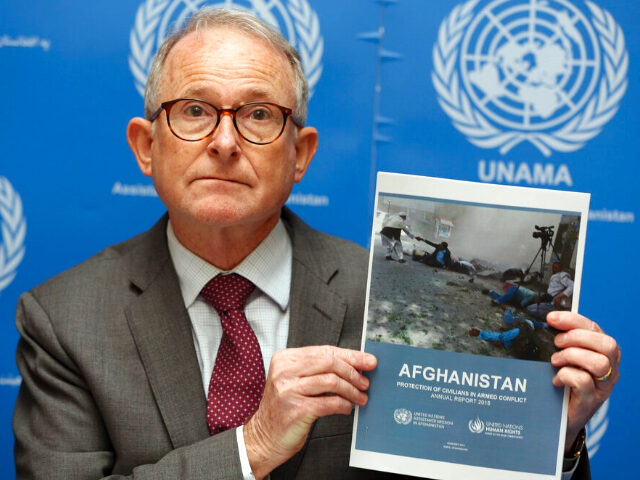The Taliban announced Wednesday that U.N. Special Rapporteur for Human Rights in Afghanistan Richard Bennett has been banned from entering the country.
The Taliban claimed Bennett was banned for lacking “professionalism” and spreading “propaganda.”
Taliban foreign ministry spokesman Abdul Qahar Balkhi told Reuters on Wednesday that Bennett was “unable to acquire a travel visa to Afghanistan” because the Taliban junta was displeased with his conduct.
“Even after repeatedly requesting Mr. Bennett to adhere to professionalism during work … it was decided that … his reports are based on prejudices and anecdotes detrimental to (the) interests of Afghanistan and the Afghan people,” Balkhi said, as Reuters quoted.
“Mr. Bennett’s travel to Afghanistan has been prohibited because he was assigned to spread propaganda in Afghanistan,” another Taliban spokesman, Zabihullah Mujahid, told the Afghan media outlet Tolo News.
Mujahid claimed Bennett “took small issues and exaggerated them for propaganda.”
A diplomatic source told Agence France-Presse (AFP) on Tuesday that Bennett was “informed of the decision that he would not be welcome to return to Afghanistan several months ago.”
The Taliban spokesmen were most likely referring to Bennett’s criticism of their regime’s appalling human rights record, especially concerning women.
Bennett issued a report in March 2023 that said the Taliban’s mistreatment of women and girls “may amount to gender persecution, a crime against humanity.”
“The Taliban’s intentional and calculated policy is to repudiate the human rights of women and girls and to erase them from public life,” Bennett said at the time.
Bennett was among those who criticized the United Nations in June for sweeping human rights issues and women’s rights off the table at the third round of U.N.-sponsored talks in Qatar on the future of Afghanistan. The Taliban did not participate in the first two rounds and said it would only attend the third forum if it was not harassed on its human rights record.
“If these exclusions are the price of the Taliban’s presence in Doha, the cost is too high,” Bennett wrote in a June op-ed for the New York Times.
“The Taliban are not recognized by the United Nations as a government and should not be treated as such. They must not be allowed to use the threat of backing out of the talks to dictate the terms of this conference or any future international process,” he wrote.
Bennett joined other U.N. human rights experts to write an open letter to the international community, urging it not to “normalize Taliban rule in Afghanistan”:
U.N. Member States must not allow the ongoing situation to become a “new normal.” Instead, they must launch a robust and coordinated effort to challenge and dismantle the Taliban’s institutionalized system of gender oppression and dehumanization of women and girls and find ways to leverage their power to prevent and stop human rights violations.
After the disastrous Biden-Harris withdrawal from Afghanistan in August 2021, the Taliban turned Afghanistan into a monstrously repressive state where women are banned from secondary education, prohibited from holding many jobs, and prevented from accessing public facilities. Violence against women, including murder, is rampant, and women are routinely subjected to forced marriage and sexual slavery.
The Taliban made some early promises to the United Nations that it would be less repressive than the regime overthrown by the American invasion of 2001, but those commitments were soon forgotten. The junta now insists its treatment of women is consistent with Islamic law and rejects all criticism of its oppressive tactics.
Supreme Leader Hibatullah Akhundzada claimed in 2023 that Taliban rule has provided Afghan women with a “comfortable and prosperous life according to Islamic Sharia.”
Bennett responded to the Taliban banning him on Tuesday by advising the U.N. Human Rights Council to send a “message” that the “abysmal treatment of women and girls is intolerable and unjustifiable on any ground, including religion.”
“The cumulative effect of the restrictions on women and girls has a devastating, long-term impact on the whole population, and it is tantamount to gender apartheid,” he declared.
The office of U.N. Secretary-General Antonio Guterres did not acknowledge or criticize the Taliban ban on Bennett. Instead, a Guterres spokesman merely insisted that “special rapporteurs play a very critical part in the global human rights architecture,” so all states should fully cooperate with them.

COMMENTS
Please let us know if you're having issues with commenting.